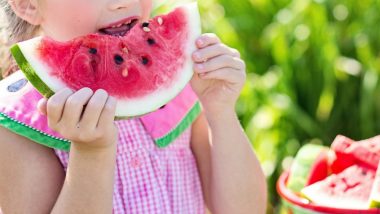The right nutrition in early years of life, starting from birth, is crucial in building a strong immune system of your child; and parents play a pivotal role in laying this foundation. A well-balanced nutritious diet can strengthen your children’s immune system resulting in fewer episodes of runny noses, colds and gastrointestinal symptoms. Though it cannot completely eliminate the chances of contracting infections, there is definite evidence that in case of illness, a balance mix of all major nutrients along with essential vitamins and minerals, can keep your child’s immune system strong. Good nutrition helps in early recovery, more efficiently and leading to less complications.
Immune boosting nutrients which should be included in the diet. For proper functioning of the immune system following nutrients play an important role.
1 Zinc: It supports immune system by reducing the duration of common cold, incidence of diarrhoea and respiratory tract infections among children. It also helps in wound healing and has antioxidant properties which reduce free radical damage to cells and tissues in our body. Your child is more susceptible to infection if he suffers from zinc deficiency. Not consuming enough zinc in the diet can reduce white blood cells and platelets. Pumpkin seeds, watermelon seeds, sunflower seeds, poppy seeds, sesame seeds (til), ajwain and cashew are good sources of zinc. Other fair sources are whole grains, peanuts, pulses and legumes, soybean, boiled egg yolk, almonds (badam), garden cress seeds (halim/aliv), mustard seeds (rai), cumin seeds (jeera), coriander seeds (dhania), cardamom (elaichi) and methi seeds.
2 Vitamin C: This enables your body to synthesise white blood cells which help fight off infections. If taken regularly, it helps reduce the duration and severity of colds, and helps manage respiratory tract infections. It forms collagen in bones and muscles, is a wound healer and keeps your child’s teeth and gums healthy. To reap the benefits of vitamin C, your child must consume parsley, capsicum (green, yellow, red), black currants, guava (peru), amla, strawberries, kiwi, lemon, sweet lime (mosambi), orange, tamarind (imli), papaya, green mango, pummelo (chakotra/papnus), radish (muli) leaves, amaranth leaves (math /chaulai), bathua, arbi leaves, drumstick and its leaves, methi leaves, mustard leaves, knol khol (ganth gobhi), cabbage, green chillies, cauliflower, karela and broccoli. Encourage your child to consume raw fruits and veggies or lightly sautéed vegetables as this vitamin is destroyed on excessive cooking.
3 Vitamin D: It strengthens the immune system and it effectively fights infection. Sufficient intake of vitamin D prevents development of autoimmune diseases. In order to absorb vitamin D, your child’s gut should be healthy and if the gut is damaged by food toxins, the absorption of vitamin D is compromised. Good dietary sources of vitamin D are eggs and fish like mackerel (bangda), sardines (tarli) and salmon (ravas).
4 Vitamin E: It plays numerous roles in our body due to its antioxidant properties, which prevent cells and tissues from environmental and free radical damage. Vitamin E deficiency results in reduction of natural killer cells thereby distressing your child’s defense system. Good food sources of vitamin E are sunflower seeds, almonds, hazelnuts, pistachio, wheat germ and vegetable oils.
5 Vitamin A and Beta Carotene: It increases the number of infection fighting cells. Our body converts beta carotene to vitamin A which has antioxidant properties and immune boosting functions. Consume a variety of colourful fruits and vegetables, containing carotenoids like mango, papaya, muskmelon, watermelon, carrot, tomato, dates, dried apricots, sweet potato, amaranth leaves, bathua leaves, beetroot leaves, paan leaves, arbi leaves, drumstick leaves, methi leaves, lettuce, mustard leaves, parsley, muli leaves and spinach.
6 Vitamin B: These provide energy from the food we eat and is important for healthy skin, eyes, liver and brain function. It is also required to produce haemoglobin, its deficiency can result in anaemia with symptoms like fatigue. If your child is low at energy and concentration, he might be deficient in this vitamin. Try to give your child enough vitamin B6 from fish which is the richest source and from moderate sources like banana, sunflower seeds, walnuts, pistachio, chicken and eggs. Frequent sickness due to poor immune function, chronic low energy levels, poor digestion, pale skin, irritability are few symptoms of folate deficiency, the synthetic form of which is known as folic acid (vitamin B9). Fish is the richest source of folate and other good sources are mustard leaves, spinach, curry leaves, parsley, mint leaves, asparagus (shatavari), broccoli, beetroot, mango, lima beans (sem phali), pulses and legumes, soybean, sesame seeds, mustard seeds, groundnuts and egg yolk.
7 Magnesium: It controls various chemical reactions in the body, is overall important for your child’s stomach and digestive function along with providing protection to the immune system.This mineral is often overlooked but needs attention. Incorporate bajra, ragi, jowar, whole wheat flour, maize flour, sunflower seeds, pumpkin seeds, sesame seeds, garden cress seeds, poppy seeds, black pepper, mustard seeds, groundnuts, cumin seeds coriander seeds, cardamom, cloves (laung), ajwain, almonds, cashews, walnuts, rajmah, chola, chowli/ lobhia, soybean, matki, urad dal, whole moong dal, rajgira/ramdana, amaranth leaves, curry leaves in your child’s diet.
8 Selenium: It provides protection from certain viral infections. Include fish, eggs, sesame seeds, garden cress seeds, mustard seeds, cashews, mushrooms, chia seeds (sabja), paan leaves, beetroot leaves, muli leaves, curry leaves, papaya, ajwain, pulses and legumes, cereals and millets like rajgira/ ramdana, bajra, barley, jowar, ragi and whole wheat in your diet.
9 Omega-3 Fatty Acids : Omega-3 fatty acids help in maintaining healthy cell membrane and reduce the formation of inflammatory compounds. EPA and DHA are omega-3 fats which increase the activity of white blood cells leading to improved immune function. It is also helpful for overcoming mood, behaviour and attention issues in children. As the human body cannot produce it on its own, it is essential to have food rich in omega-3 fatty acids which are found in fish like salmon, herring, mackerel, tuna, oil sardines, flaxseeds (alsi), sabja seeds, soybean, spinach and nuts like Walnuts. To boost omega-3 fatty acids in your child’s diet, try adding 1/2 to 1 teaspoon of ground flaxseeds to cereals, yoghurt, salads, dals, snacks, soups, baked foods and variety of dishes.
10 Proteins: Consuming too little protein can weaken your child’s immune system. Include cereals, pulses and dals, nuts and seeds, soybean, milk and milk products, chicken, fish and eggs to meet your child’s essential amino acid requirement. Try adding mushrooms in your child’s diet. Animal proteins are of high quality, however plant aren’t due to low content of some amino acids. However, a combination of various plant proteins like cereal, pulses and nuts or seeds can provide most of the amino acids and better quality proteins. Essential amino acids cannot be made by the body and has to be provided from food so that children grow and function optimally as its deficiency might result in weight loss, infections and muscle weakness among children.
When children get exposed to viruses or pathogens, those with a weakened immune system is more vulnerable to catch infection than one with a healthy one. Parents just feel helpless, not realising that eating immune boosting fruits, vegetables and other immune boosting foods just during that phase of illness cannot provide a quick burst of relief; there has to be a constant intake of immune boosting foods along with adoption good hygiene practices.
(This article has been contributed by Dr. Swati Bhushan, Chief Clinical Nutritionist, Hiranandani Hospital, Vashi – A Fortis Network Hospital)
(The above story first appeared on LatestLY on Apr 05, 2018 12:59 PM IST. For more news and updates on politics, world, sports, entertainment and lifestyle, log on to our website latestly.com).













 Quickly
Quickly


